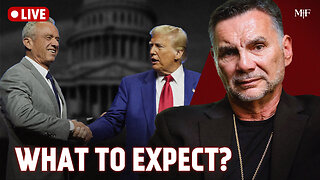Premium Only Content

Pakistaan And IMF | Details |
: Welcome to everyone in the room and to our viewers around the world to the press briefing on the April 2023 Global Financial Stability Report. I am Randa Elnagar of the IMF’s Communications Department.
Let me introduce our speakers today. Tobias Adrian, Financial Counsellor and Director of the Monetary and Capital Markets Department. Fabio Natalucci, Deputy Director of the Monetary and Capital Markets Department. And Charles Cohen, Deputy Division Chief of the Monetary and Capital Markets Department.
Before taking your questions, let me kick‑start our conversation today and turn to Tobias and ask him a few questions.
Tobias, a lot has happened since we last spoke in October, including the recent turmoil in the banking sector. How do you assess the global financial stability in light of the recent events?
So, we have seen turmoil in the banking sector in the U.S. and in Switzerland. And that really reflects the heightened vulnerabilities that have been building up over years of low interest rates. As interest rates are being raised, vulnerabilities are appearing. We saw that already last October, when we met here for the Annual Meetings, where we saw stress in the non‑bank financial sector in the U.K., more specifically, at that time; and we have seen it in March in the banking sector in the U.S. and Switzerland. There are certainly other vulnerabilities out there, and sharp adjustments in interest rates, sharp adjustments in expectations can trigger further stresses.
In the case of Switzerland, the government supported a merger between two banks which, again, stabilized the financial stability situation.
And, finally, in the case of the U.K., back in October, the Bank of England deployed targeted and time‑limited asset purchases to stabilize the LDIs that were under stress.
And so in all of these cases, basically, central banks could continue to tighten monetary policy because they had the tools to contain threats to financial stability. The Federal Reserve increased interest rates after the SVB episode. The Swiss National Bank increased interest rates after the Credit Suisse merger. And, of course, back in‑‑since October, the Bank of England has hiked interest rates since the LDI episode.
So this is really the playbook, you know, that is ideal. Where there are financial stability problems, use targeted tools to address those and continue to use your monetary policy to fight inflation. Inflation remains high, well above target in many countries. What is priced into markets at the moment is a relatively optimistic view about inflation going forward. Inflation is expected, is priced in by markets to come back down to targets fairly quickly. And while we certainly hope that this is going to be the case, there is certainly a risk around this outlook on inflation. Inflation could prove to be more persistent, which could lead to a reassessment of the path of policy for monetary policy. And, you know, that could, again, trigger certain financial sector instabilities. So vulnerabilities are certainly elevated, both in the banks and in the non‑bank financial sector.
Secondly, you referred, in rather friendly terms, to some of these bank bailouts. Don’t they run in‑‑don’t they fly in the face of the kind of rules which were set by the Financial Stability Board after the great financial crisis?
Now, in the case of, you know, Credit Suisse, that resolution regime was not being used; but I would argue that the outcome was fairly similar to what would have occurred under resolution. Of course, it’s always difficult to, you know, judge, in retrospect, those outcomes.
In terms of the U.S. banks, the systemic risk exemption was being used, and that does have a cost to the Deposit Insurance Fund. But, of course, the systemic risk exemption was created for these types of circumstances. So I think it was, again, successful in terms of containing, you know, any spread of loss of trust or withdrawal of deposits.
Now, you are asking about sort of like the costs and benefits. And absolutely, you know, going forward, I think there will be a debate about whether policy instruments, institutions can be designed to mitigate moral hazard even more. Right? You know, unfortunately, it is really difficult to entirely get rid of moral hazard, but you can minimize it as much as possible. I think the trade‑offs were reasonable in these situations. They were fairly contained; but, of course, to contain moral hazard even further is certainly a desirable policy outcome, while containing financial stability threats.
I would like to thank our speakers, Tobias, Fabio, and Charles. Also, thanks to you and to our viewers who joined us today. We would like to remind you of the release of the Fiscal Monitor tomorrow morning at 8 a.m. in the same room, and we have the regional briefings to answer your questions. Thank you very much.
-
 8:22
8:22
Russell Brand
3 hours agoThey want this to happen
22.9K124 -
 LIVE
LIVE
Jewels Jones Live ®
22 hours ago2025 STARTS WITH A BANG! | A Political Rendezvous - Ep. 104
1,956 watching -
 LIVE
LIVE
Viss
3 hours ago🔴LIVE - PUBG Duo Dominance Viss w/ Spartakus
1,596 watching -
 LIVE
LIVE
MDGgamin
6 hours ago🔴LIVE-Escape From Tarkov - 1st Saturday of 2025!!!! - #RumbleTakeover
396 watching -
 LIVE
LIVE
SpartakusLIVE
2 hours agoPUBG Duos w/ Viss || Tactical Strategy & HARDCORE Gameplay
210 watching -
 LIVE
LIVE
FRENCHY4185
2 hours agoFRENCHY'S BIRTHDAY BASH !!! THE BIG 40 !!!
127 watching -
 1:23:33
1:23:33
Michael Franzese
11 hours agoThings to look forward to in 2025
33.4K26 -
 3:23:02
3:23:02
I_Came_With_Fire_Podcast
12 hours agoDefeating VICTIMHOOD: Advocacy, Resiliency, and Overcoming Abuse
54.5K13 -
 2:00:56
2:00:56
Game On!
18 hours ago $9.15 earnedNFL Experts debate if Joe Burrow will make HISTORY in Week 18!
83.5K10 -
 2:07:57
2:07:57
InfiniteWaters(DivingDeep)
4 days agoHOW TO ENTER 2025 LIKE A BOSS!
21.3K1